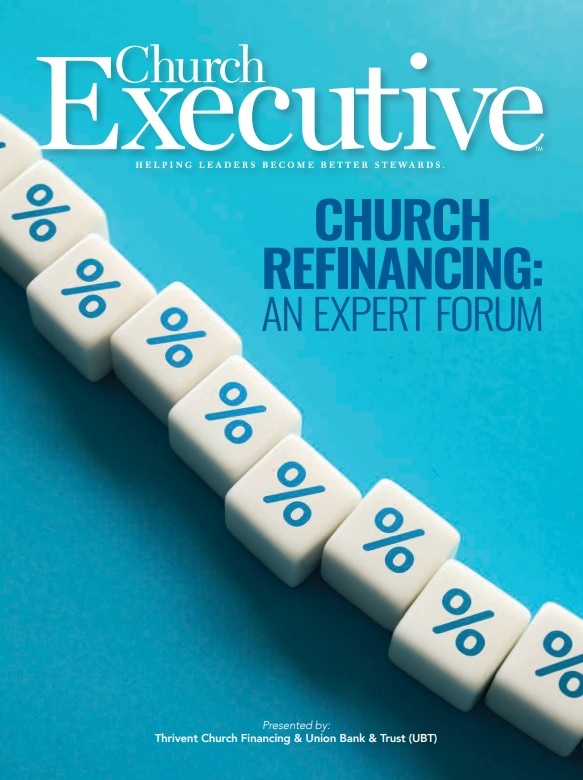
 Consider these in-the-trenches, professional perspectives
Consider these in-the-trenches, professional perspectives

Vice President of
Church Financing
Union Bank & Trust (UBT)
Church Executive: With interest rates as they are, is it still a good time to consider refinancing?
Charity Kuehn: Every situation is a little different. There will be times when you’ll be forced to refinance during a higher-interest-rate environment because your loan comes due. If so, there are lots of things you can do to try to maximize your situation.
But if you don’t have to refinance right now, most likely it isn’t the best time to do it. If you’re in a lower rate and you’ve got a couple years left on that — even with the thought of, What if rates continue to go up? — take advantage of that low rate while you still have it. A lot of factors can change between now and the future. Since none of us know what those changes will be, it’s best to just take advantage of that lower rate while you can.
CE: For churches that do need to refinance now, how can they prepare to start reaching out to lenders?
Kuehn: One of the first things that I tell current or future clients is to be sure you have somebody you trust within your congregation or your church community who can tell you what terms exist that might affect you during a refinance. (For example, are there any fees?) Evaluating your current situation is really important.

The next step is to make sure you’re prepared. Have your financial information at your fingertips. Make sure it makes sense, is up-to-date and, ideally, that a professional has looked at it. A lot of churches are working off of financials that are company-prepared, internally prepared, or sometimes even prepared by a volunteer rather than an accountant or a CPA. But if you want to get the best refinancing offers, you need to have numbers that demand those better offers; that means numbers that make sense — that are clean, clear and concise.
CE: Once numerous refinancing options are secured, how can a church leader decide which one is best?
Kuehn: Of course, the rate and term are critical; but sometimes the fine print is what will differentiate one lender from another.
Be sure to look at the fine details in an offer. Depending on who you’re working with for refinance — whether it’s a traditional bank, credit union, individual lender, denominational lender, and so on — they all do things a little differently. Read the fine print for any fees that might be a little harder to see, or any covenants which the lender might be including in your loan; by that, I mean certain ratios that they’re going to expect you to meet year-over-year. If your church is unable to meet those ratios, it could adversely affect your loan status.
Or sometimes, a lender will require that specific documents are provided every year.
All of these are key points to consider.
CE: How important should a lender’s “local presence” be when evaluating refinancing options?
Kuehn: This is an interesting question. We’re a community bank, so we pride ourselves on our local presence and our services locally. At the same time, we offer our services nationally. So, I get to really see both sides of the coin.
I feel like we need to replace the word ‘local’ with ‘relationship’. You want to develop a relationship with a lender — whether they’re in your city or not — in which you know you can trust them, that you can call them up and ask them questions when times are good and when times are tough. That’s far and away a bigger asset than proximity.
CE: What about longevity in the church lending marketplace? How important is that?
Kuehn: It’s really important. You’ll want to know how many churches this particular lender has worked with, as well as what types of loans they’ve done, how many, and what size. All of these considerations should be factored into your decision.
The church lending world is a kind of small family of lenders, so we mostly all know each other, and there are a bunch of really, really good ones. I think that there’s enough experience in the marketplace that a church should be picky about that.
CE: Securing a favorable rate / package is one thing, but what should a church be looking for on a long-term customer care basis?
Kuehn: I can’t emphasize enough the importance of long-term customer care.
I’ve said it a couple times already, but the relationship you build with your lender should feel comfortable; you should be able to talk through situations and feel as if the lender is part of your financial team. The lender should be on your side through thick and thin, even if your questions have nothing to do with your loan. That’s probably the highest priority: finding a lender that can really be part of your church’s overall financial picture.
— Reporting by RaeAnn Slaybaugh
Charity Kuehn is UBT’s Vice President of Church Financing, using her 25 years of experience to help churches across the country develop creative solutions to fit the needs of growing and changing church families.


